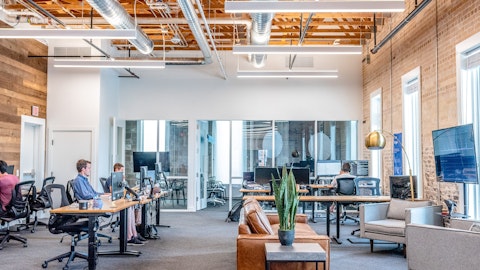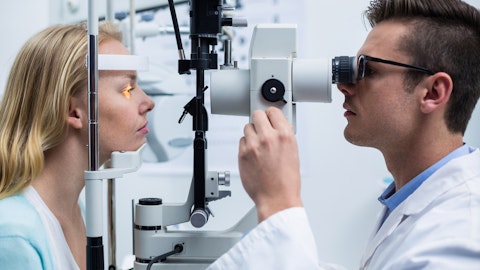Craig Hettenbach: Thank you.
Peter Gassner: Thanks.
Operator: We’ll take our next question from Rishi Jaluria, RBC Capital Markets.
Rishi Jaluria: Wonderful. Thanks so much for taking my questions. Peter, let me start by diving a little bit deeper into the generative AI piece and less in terms of how it impacts your engineering and software development efforts. And more I want to think about what is the impact on the actual industry itself. I mean we saw recently, right? There’s a pharma company that is putting a drug through clinical trials soon and the entire drug was designed by generative AI. So there clearly seems to be potential disruption coming to the industry from generative AI. Can you maybe talk about what you think that could happen — what impact that could have on your customers and how you think that will impact your business? And then I’ve got a follow-up.
Peter Gassner: Well, pretty early on that. I didn’t read that exact press release. I would be surprised if no human touch that drug during its development and its approval. And so I don’t think that probably happened. I think there’s promising things in the early phase of discovering a drug, and that’s not actually really due to the large language models or the generative AI. That’s more to machine learning algorithms that are math based. So I guess I don’t want to be a skeptic here, but I don’t see the real revolution. And that’s the thing about revolution. You’ll know it when they happen. And so far, we really haven’t seen it.
Rishi Jaluria: Okay. Totally fair. I appreciate that. And I wanted to think about the impact from a number of drugs coming off patent this year and maybe next 18, 24 months? Obviously, the big one with AbbVie’s Humira — how are you thinking about the potential puts and takes on that? Is that going to have an impact on the number of pharma reps and maybe lead to further cuts, which has an impact on the CRM business? And maybe conversely, given the patent close coming off, can that be a tailwind for R&D as some of the big companies try to iterate on drugs faster and get new drugs, blockbuster drugs out to market. Thanks.
Paul Shawah: Yes, I can take that. This is normal course of business for the industry. As you look out over the next five years compared with the last five years, the amount of revenue that’s at risk over the next five years as a percentage of the overall industry revenue is actually slightly less than the last five. So it’s kind of an interesting patent thing. It happens. This is normal course of business for the industry. Now what tends to replace the revenue from those drugs that lose their patent expiration is new medicines. So you brought up the AbbVie example. There’s — and this is in the public domain and there’s expectations that new medicines from AbbVie will be just as large, if not larger, than Humira was in the marketplace.
So that’s very common, right? The industry invest a lot in R&D, they innovate and new medicines replaced the revenue from previous medicines, which to your point earlier, means more clinical trials, it means more launches, more drug approvals, and then ultimately, it means sales reps continue to sell and launch these new medicines. So it’s kind of this virtuous cycle in the industry, I expect that to continue, if not get stronger because of the amount of investment the industry is making.
Rishi Jaluria: All right, great. Really helpful. Thank you so much.
Operator: Up next is Saket Kalia, Barclays.





